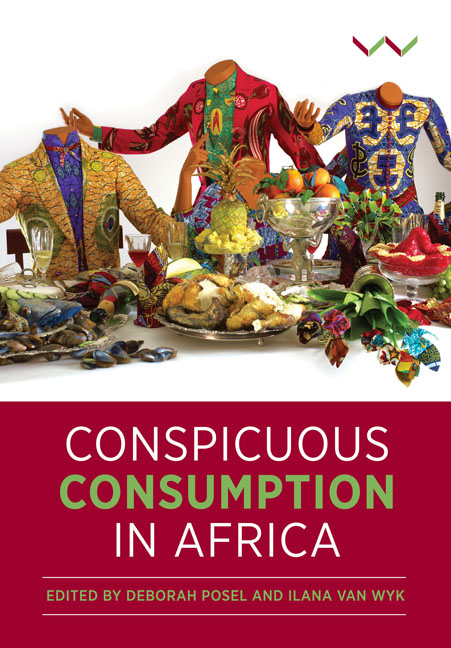Book contents
- Frontmatter
- Contents
- Acknowledgements
- List of Illustrations
- 1 Thinking With Veblen: Case Studies From Africa's Past and Present
- 2 Changes in the Order of Things: Department Stores and the Making of Modern Cape Town
- 3 Conspicuously Public: Gendered Histories of Sartorial and Social Success in Urban Togo
- 4 Etienne Rousseau, Broedertwis and the Politics of Consumption Within Afrikanerdom
- 5 Recycling Consumption: Political Power and Elite Wealth in Angola
- 6 Chiluba's Trunks: Consumption, Excess and the Body Politic in Zambia
- 7 Jacob Zuma's Shamelessness: Conspicuous Consumption, Politics and Religion
- 8 Precarious ‘Bigness’: a ‘Big Man’, His Women and His Funeral in Cameroon
- 9 Young Men of Leisure? Youth, Conspicuous Consumption and the Performativity of Dress in Niger
- 10 Booty on Fire: Looking at Izikhothane With Thorstein Veblen
- 11 Conspicuous Queer Consumption: Emulation and Honour in the Pink Map
- 12 The Politics and Moral Economy of Middle-Class Consumption in South Africa
- 13 Marigold Beads: Who Needs Diamonds?!
- Contributors
- Index
2 - Changes in the Order of Things: Department Stores and the Making of Modern Cape Town
Published online by Cambridge University Press: 29 October 2019
- Frontmatter
- Contents
- Acknowledgements
- List of Illustrations
- 1 Thinking With Veblen: Case Studies From Africa's Past and Present
- 2 Changes in the Order of Things: Department Stores and the Making of Modern Cape Town
- 3 Conspicuously Public: Gendered Histories of Sartorial and Social Success in Urban Togo
- 4 Etienne Rousseau, Broedertwis and the Politics of Consumption Within Afrikanerdom
- 5 Recycling Consumption: Political Power and Elite Wealth in Angola
- 6 Chiluba's Trunks: Consumption, Excess and the Body Politic in Zambia
- 7 Jacob Zuma's Shamelessness: Conspicuous Consumption, Politics and Religion
- 8 Precarious ‘Bigness’: a ‘Big Man’, His Women and His Funeral in Cameroon
- 9 Young Men of Leisure? Youth, Conspicuous Consumption and the Performativity of Dress in Niger
- 10 Booty on Fire: Looking at Izikhothane With Thorstein Veblen
- 11 Conspicuous Queer Consumption: Emulation and Honour in the Pink Map
- 12 The Politics and Moral Economy of Middle-Class Consumption in South Africa
- 13 Marigold Beads: Who Needs Diamonds?!
- Contributors
- Index
Summary
One of the strands in Thorstein Veblen's Theory of the Leisure Class that commentators tend to ignore – for good reason – concerns his remarks about the relationship between consumption patterns and race. Giving an evolutionary account of the ‘dominating influence … of the dolicho blond type of European man’ (Veblen 2003: 104), Veblen reproduces a racialised hierarchy of ‘civilisation’, but within an anachronistic account (both conceptually and historically) that carries little interest in current debates or commentaries. His text, then, has little to contribute on what is arguably a critical dimension of conspicuous consumption in racialised societies – namely, the ways in which this consumer practice is fundamentally shaped by the intersections between the racial order and the material order of things. Yet despite these obvious gaps, Veblen's insistence on the importance of the realm of material consumption in producing social hierarchies and their symbolic grammars is absolutely pertinent – not least in the making of race.
In the same period about which Veblen was writing, but far away, in the modernising colony of the Cape, a distinctive regime of conspicuous consumption was emerging within the middle and upper echelons, largely (although not exclusively) white. New notions of material abundance intersected with practices of race, as well as class and status, becoming central to the configuration of Cape Town as a worldly port city.
From the late nineteenth century, unprecedented volumes and varieties of stuff became available within South Africa. This was a consequence of both global and national developments. As Christopher Alan Bayly (2004: 472) puts it, this period was marked by a ‘great acceleration’ – ‘the dramatic speeding up of global social, intellectual and economic change’ – including in the movement of things and people around the world. More effective global networks of trade enabled, inter alia, by the advent of steam ships moved greater quantities of goods around the world more frequently than before. That these were available for circulation was a consequence, in turn, of recent technologies of mass production and scientific invention, created and driven by burgeoning markets for their consumption. Within South Africa, harbours were upgraded to expedite growing networks of import and export trade, railways were built to enable transportation from coastal to inland destinations, while new consumer markets were buoyed by the growth of the diamond and gold fields.
- Type
- Chapter
- Information
- Conspicuous Consumption in Africa , pp. 25 - 44Publisher: Wits University PressPrint publication year: 2019



